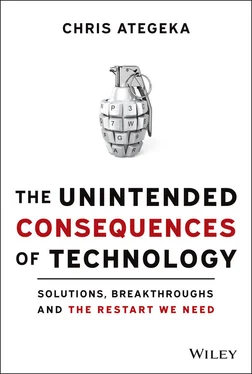In another classic example, the mobile messaging app called WhatsApp posed a unique threat to Facebook's growth, giving users the ability to send messages on their mobile devices, both one-to-one and to groups, for free. In February 2014, Facebook acquired WhatsApp (Olson, 2014).
You may still be wondering why monopolies are bad. Besides often having more power than the nation-states in which they operate, there are many other negative consequences. For one, if there is one company on the block, it can increase prices whenever and however they like. If a single firm sets the price for an entire industry, prices will always be on the rise. Price discrimination is also common, since there is no transparency and consumers have no viable alternatives.
How to Mitigate the UCOTs of Tech-State Companies
In the short term, while both nation-states and tech-states are under centralized control, many people see an increased need for more government intervention and regulation of these tech-state companies. There are at least four areas related to humanity and the planet that need regulation: safety, privacy, competition, and honesty.
Over the past decade, tech giants have risen to become the most valuable companies in the world, all while operating with little formal, structured government oversight. The tiny patchwork regulatory oversight and industry self-regulation both lack transparency and coherence to affect any meaningful change. Only by coordinating action across all four policy paths will we see any real change. Europe often leads the way and again recently overhauled the digital rules that some experts say could become a global standard for keeping these companies in check (Browne, 2020).
If there is something that's clear, as a society we need to design an alternative system, perhaps a decentralized system of tech-state and nation-state.
We got into this pickle because initially tech was fighting the fact that government was too powerful and was getting into people's businesses and affecting how citizens consume goods.
At first, tech and the free market gave citizens free will and autonomy and spared them from the overbearing power of the government. As we have discussed, that has turned out to be an overcorrection, as the power appears to be flipping from nation-states to tech-states.
An oversized, powerful centralized tech-state has many disadvantages. An oversized, powerful centralized nation-state in the form of a dictatorship or quasi-democratic government is not good either.
Take the example of tech entrepreneur and billionaire Bill Gates. In 1998, Gates and his company, Microsoft, faced monopoly and antitrust charges in which Microsoft lost. In this high-profile case the U.S. government accused Microsoft of illegally maintaining a monopoly position in the personal computer (PC) market and of illegally protecting its operating-system monopoly and seeking a new monopoly for its own browser, Internet Explorer (Blumenthal and Wu, 2018). In this case, the nation-state power was at full display.
We see this scenario play out verbatim with the 2020 fallout of China and one of its prodigal sons, Jack Ma. He also happens to be one of the richest people in the world.
In China, Jack Ma was synonymous with success. The English teacher turned Internet entrepreneur was the country's richest person. He founded Alibaba, the closest thing Amazon has to a peer and rival. After Donald Trump was elected president in 2016, Mr. Ma was the first high-profile Chinese person he met with.
That success translated to a rock-star life for “Daddy Ma,” as some people online called him. He played an unconquerable kung fu master in a 2017 short film packed with top Chinese movie stars. He sang with Faye Wong, the Chinese pop diva. A painting he created with Zeng Fanzhi, China's top artist, sold at a Sotheby's auction for $5.4 million. For China's young and ambitious, Daddy Ma's story was one to emulate.
But then came 2020, when his public sentiment soured and Daddy Ma became the man people in China loved to hate. He was called a “villain,” an “evil capitalist,” and a “bloodsucking ghost.” A writer listed Mr. Ma's “10 deadly sins.” Instead of “Daddy,” some people have started to call him “Son” or “Grandson.” In stories about him, a growing number of people left comments quoting Marx: “Workers of the world, unite!” (Yuan, 2020).
In 2021, China's central bank asked the country's payments giant Ant Group Co Ltd (which is owned by Jack Ma) to shake up its lending and other consumer finance operations. This was the latest blow to its billionaire founder and controlling shareholder.
The People's Bank of China (PBOC) summoned Ant Group executives and ordered them to formulate a rectification plan and an implementation timetable of its business, including its credit, insurance, and wealth management services (Deutsche Welle, 2020). The statement said that Ant Group lacked a sound governance mechanism, defied regulatory compliance requirements, and engaged in regulatory arbitrage. It also said that the company used its market position to exclude rivals and damage the rights and interests of consumers.
Ma and his family ranked first as China's richest in the Hurun Global Rich List in (Hurun, 2020). As of this writing, Ma now holds fourth place, losing the first rank after Chinese regulators launched alleged anti-monopoly probes into his companies, Alibaba and Ant Group (Yu, 2020).
Clearly, when a government has the power and ability to control its citizens, people are going to resent it. When capitalism makes it possible for power to flip from nation-states to tech-states, the government and the people will resent it. This dynamic of one source of dominating power is problematic in many ways; that's why decentralization of power back into the hands of the people has always been appealing to the masses.
Dozens of start-ups now offer alternatives to Facebook, Twitter, YouTube, and Amazon's web hosting services, all on top of decentralized networks and shared ledgers. Many of these alternatives have gained millions of new users, according to the data company SimilarWeb (Singh, 2021).
Many countries now offer alternatives to centralized governments in the form of decentralized virtual citizenship, which is a commodity that can be acquired through the purchase of real estate or financial investments, subscribed to via an online service, or assembled by peer-to-peer digital networks. In Malta, Cyprus, Estonia, the United Arab Emirates, and elsewhere, passports can now be bought and sold, all to solve the problem of the imbalance of power dynamic (Bridle, 2018). Decentralization and putting power back into the hands of the people is a promising third alternative away from the power swing between tech-state and nation-state.
1 “Attorney General Letitia James Leads Multistate Lawsuit Seeking to End Facebook's Illegal Monopoly.” (2020). Press release. https://ag.ny.gov/press-release/2020/attorney-general-james-leads-multistate-lawsuit-seeking-end-facebooks-illegal
2 BBC News. (2009). “Construction workers in fresh ‘blacklisting’ action.” https://www.bbc.com/news/business-47349008
3 Blumenthal, Richard, and Tim Wu. (2018). “What the Microsoft Antitrust Case Taught Us.” https://www.nytimes.com/2018/05/18/opinion/microsoft-antitrust-case.html
4 Bridle, James. (2018). “The Rise of Virtual Citizenship.” https://www.theatlantic.com/technology/archive/2018/02/virtual-citizenship-for-sale/553733/
5 Browne, Ryan. (2020). CNBC.com, “Europe tries to set the global narrative on regulating Big Tech.” https://www.cnbc.com/2020/12/16/europe-tries-to-set-the-global-narrative-on-regulating-big-tech.html
6 Business Standard. (2020). “US govt, 48 states sue Facebook for abusing power to crush smaller rivals.” https://www.business-standard.com/article/pti-stories/us-govt-48-states-sue-facebook-for-abusing-market-power-to-crush-smaller-competitors-120121000123_1.html
Читать дальше












